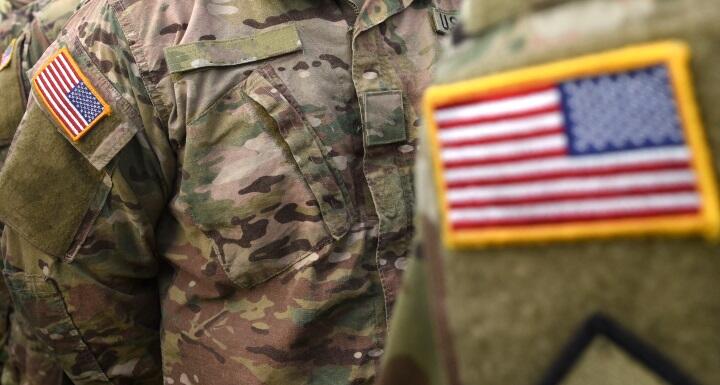"We are at war. It's a different type of war, but a war nonetheless." - General Mark A. Milley, US Army, Chairman of the Joint Chiefs of Staff, on the military's response to COVID-19.
"The Defense Industrial Base (DIB) is identified as a Critical Infrastructure Sector.… If you work in a critical infrastructure industry… you have a special responsibility to maintain your normal work schedule."-Ellen M. Lord, Undersecretary of Defense for Acquisition and Sustainment
The military's impact on North Carolina is massive.
But the economic engine behind the military is largely unseen by those not in uniform, working for the Defense Department, or contractors on military jobs. Many people are surprised to learn that the Defense Department employs more residents and spends more money in the State than any other single employer. Active duty military installations and Defense contractors make-up the second-largest business sector in the State; only agriculture is more pervasive and far-reaching. The N.C. Department of Commerce estimates that the annual economic impact of the military exceeds $60 billion.
The COVID-19 pandemic strikes at the core of our society, including our military's defense industrial base ("DIB"), with the effectiveness of a seasoned enemy. Governor Roy Cooper and many local jurisdictions have issued shelter-in-place orders. Movement is restricted. People are sick, hospitals are filling up with critical care patients, and the public health crisis seems to have no end.
Yet, DIB contractors and their employees have a patriotic commitment to continue their support for the Nation's defense. These companies also have a legal obligation to do so.
Whenever a company agrees to perform a service or deliver a product to the Defense Department, there are special obligations to perform during a national emergency. During the current pandemic, the obligations are being modified, and contractors are being given special flexibility in terms of staffing and delay costs. However, a contractor can lose out on significant financial and time relief if it does not follow the Defense Department's regulations. The failure to comply with the Defense Department's terms also means severe repercussions to a contractor's ability to operate or even survive. This is true in a good economy. A national emergency followed by a recession makes the stakes much higher for contractors.
The Military Needs Contractors to Succeed
DIB contractors are important. The DIB sector is defined as the industrial complex that enables research and development as well as design, production, delivery, and maintenance of military weapons systems/software systems, subsystems, and components or parts, as well as purchased services to meet U.S. Military requirements. Without DIB contractors, the Nation's vulnerability is higher. The Defense Department needs DIB contractors to perform at even higher levels today than when the Nation is not at war—even if the war is against COVID-19.
The DIB is a very broad sector. It includes obviously essential companies that supply ammunition or parachutes, but also behind-the-scenes construction and building maintenance companies working on the facilities that allow the military to perform. Companies that mow the grass, provide recreation, or provide basic office supplies are not normally part of the DIB.
However, both DIB and non-DIB companies must be aware of their obligations and opportunities during the COVID-19 crisis.
What should contractors do?
Review your contract. The most important resource for a contractor is the actual contract, whether paper or electronic. The original solicitation, incorporated Federal Acquisition Regulation ("FAR") clauses, change orders, and contracting officer policies will, at least in legal terms, determine whether a contractor fails or succeeds.
Communicate with the contracting officer and his or her representative. Contractors must balance performance on the contract with staffing stresses, sick employees or their family members, disrupted supply chains, and so on. Going to the contracting officer and the end-user often and early will help avoid problems later. The FAR encourages the government and contractors to reach mutually beneficial agreements when faced with unusual or unexpected circumstances. If a contractor can demonstrate clearly and with evidence that it needs relief because of COVID-19, we have seen the government willing to cooperate. But make sure any agreement or modification is in writing, preferably on the appropriate Defense Department form. Whenever possible, get the writing before incurring extra expense or performing a material change in the contract. This writing will be essential if the government "misremembers" the situation and penalizes the contractor. It is also essential if the contractor later wants to make a request for equitable adjustment or a contract claim.
The Defense Logistics Agency put it this way in a March 13 COVID-19 memo:
"[We ask] that you keep us informed of potential impacts to the welfare and safety of your workforce or contract performance. Because each contract may have different terms and conditions, in the event your contract performance is impacted due to this evolving situation, keep in mind that it may require a variety of resolutions. The contracting officer is the agency authority and can discuss options to minimize impacts to your company's requirements."
Don't delay your communications—even if you do not believe you have a problem. COVID-19 has taught us that nothing is predictable, even in a Defense Department contract.
Understand What Relief Might be Available
Hopefully, your review of the contract and early communication with the contracting staff will help you through the crisis. But what if your company is financially hurt or unable to perform? You need to understand that the FAR and Defense Department policy provides relief. Review and seek guidance if needed, especially for relief contained in:
- Changes clause (for example, FAR 52.243-1 and 52.212-4). The clause is absolutely essential if you want to get paid for a change or if you want to defend your actions in a government audit.
- Stop work clause (for example, FAR 52.242-15) or the Suspension of work clause (for example, FAR 52.242-14). These provisions allow for equitable adjustments that include increased costs and, sometimes, lost profit.
- For GSA and Defense supply schedule sales, the Economic Price Adjustment clause could become very important. This clause allows the Defense Department to increase its price paid to reflect extreme changes in the market, exactly as we are seeing with COVID-19.
Determine if Section 3610 of the CARES Act Applies
Ed. Note: April 10, 2020- Since publication of this article, the Defense Department released guidance on the CARES Act Section 3610 process for contractors to take advantage of additional payroll relief. See guidance here and the related FAQ document here.
In addition to these regular relief FAR clauses discussed above, Congress wrote into the recently-passed COVID-19 relief law, now called the CARES Act, as a special provision for Defense Department (and all other federal) contractors. This provision is found here.
In summary, Section 3610 allows the Defense Department (and all other federal agencies) to modify the terms and conditions of an existing contract to reimburse the contractor for paid leave, including sick leave, the contractor provides to employees due to an employee's inability to work as a result of the COVID-19 public health crisis. Utilization of Section 3610, unfortunately, could be very limited because it is discretionary and subject to available funds. That is, if the contracting officer does not want to offer the Section 3610 benefit, he or she is not required to do so.
Defense Department contractors can request modification of the contract to reimburse for paid leave if: (1) their employees perform work on a site that has been approved by the federal government; and (2) their employees are unable to work due to facility closures or other restrictions arising from the COVID-19 pandemic. Contractors should keep in mind that the use of Section 3610 must be justified. For example, it would be prudent to provide employees with a writing explaining they are being furloughed or reduced because they were working on a federal contract that has been frustrated by COVID-19.
Review Defense Department Resources
The Defense Department created several COVID-19 information pages. The most important for contractors are here and here. These should be considered essential reading for all military contractors. They cover the essential legal and performance issues contractors are likely to encounter:
- Change in operational ability
- FAR deviation clauses and revised progress payment rates
- Remote performance when on-site presence was originally required
- Resources especially for small businesses
- Offering to sell personal protective equipment to the Defense Department
- Donating public health services or supplies to a branch of the military
- Employees unable to work due to COVID-19
What's Next?
COVID-19 is not over, but we look forward to it when it is. Defense contracting will continue in the face of all adversity. To assist contractors, Congress is already working on a contractor protections and guidance for the Defense Department. These new measures are likely to be included, at least in part, in the 4th installment of the COVID-19 relief legislation (the CARES Act being the most recent). Highlights of coming Congressional efforts include:
- More consistent implementation. COVID-19 relief and contract modifications need to be consistent and beneficial, according to Senator Mark Warner (D-VA), who wrote to the executive branch, "Without such overarching directive, I fear that agencies and their contracting officers will take disparate approaches, leading to uncertainty and instability in the contractor industrial base, if not a permanent loss of capability." We expect more uncertainty before there is any consistent guidance.
- Heightened focus on the DIB and Defense Department Contractor Sustainability. Representative Mac Thornberry (R-TX) has been a champion for Defense Department innovation. After the CARES Act became law, he began promoting a bill called the Expanding Acquisition Reform Act. He proposes to add reporting and briefing requirements to the Defense Department, requiring the organization to regularly assess technological vulnerabilities and gaps in its supply chain, mitigation strategies, and timelines. The bill requires the Defense Department to report whether they lack funds to address industry base vulnerabilities. Then, the bill would require the Pentagon leadership to help contractors address those vulnerabilities.
COVID-19 has exposed an entirely new (or at least underappreciated) vulnerability to our Nation's defense. As Representative Thornberry said, "One of the lessons we have already learned from the country's COVID-19 response is that we must pay closer attention to the vulnerabilities in the industrial base, especially the Defense Industrial Base."
We expect these challenges to continue well past the current COVID-19 crisis, but together we can support the military and our Nation's defense through the private-sector's essential defense industrial base.








